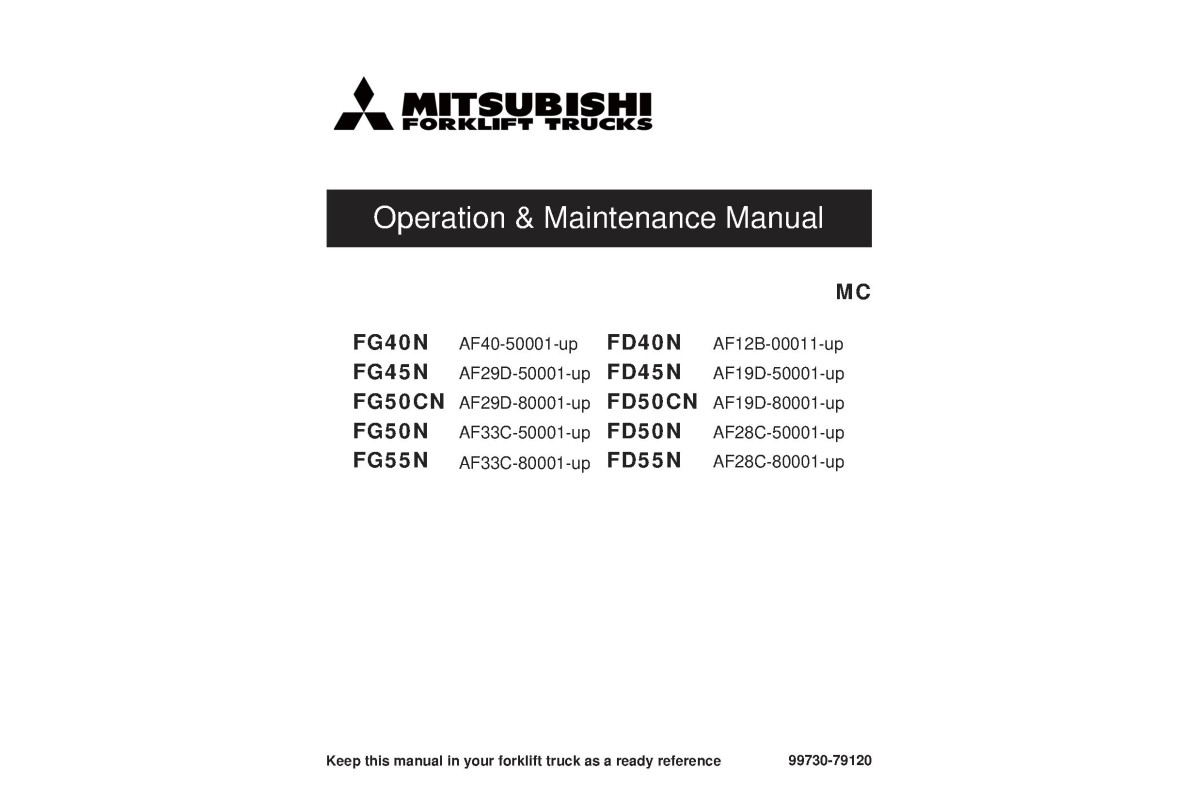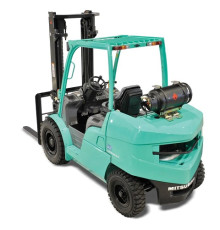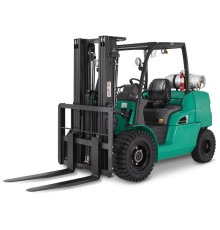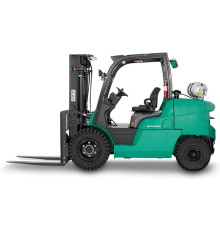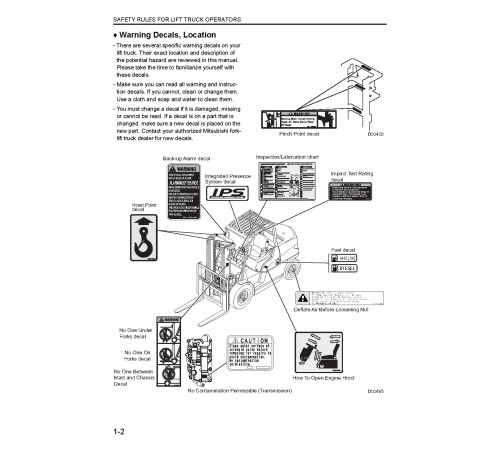
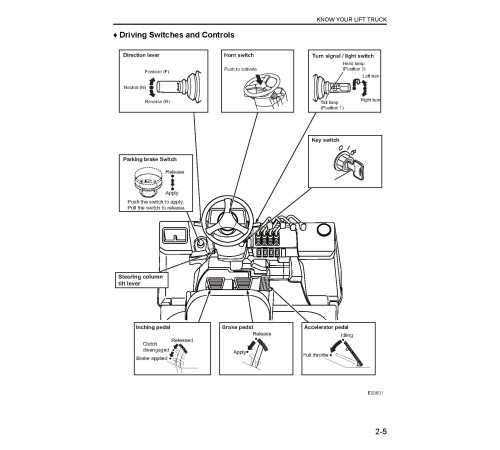
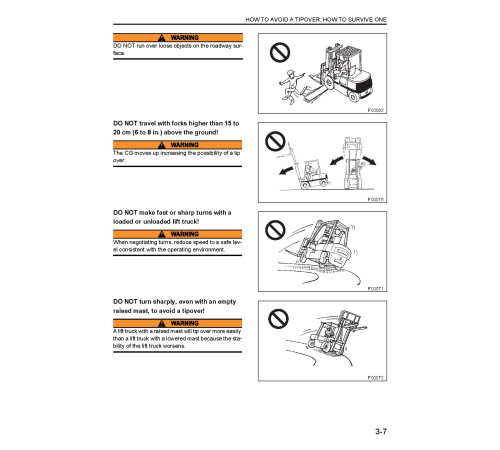



Illustrated factory Operate and Maintenance manual for Mitsubishi Forklift Trucks Models FG40N (AF40-50001-up), FG45N (AF29D-50001-up), FG50CN (AF29D-80001-up), FG50N (AF33C-50001-up), FG55N (AF33C-80001-up), FD40N (AF12B-00011-up), FD45N (AF19D-50001-up), FD50CN (AF19D-80001-up), FD50N (AF28C-50001-up) and FD55N (AF28C-80001-up).
This manual will assist you in operating, and maintaining for your forklift truck.
You can use a Windows, Mac, or Android device to view this manual. You only need to have a PDF reader installed.
Covered Models:
FG40N (AF40-50001-up)
FG45N (AF29D-50001-up)
FG50CN (AF29D-80001-up)
FG50N (AF33C-50001-up)
FG55N (AF33C-80001-up)
FD40N (AF12B-00011-up)
FD45N (AF19D-50001-up)
FD50CN (AF19D-80001-up)
FD50N (AF28C-50001-up)
FD55N (AF28C-80001-up)
Format: PDF, 234 pages
Language: English
Table of Contents:
SAFETY RULES FOR LIFT TRUCK OPERATORS
General
Warning Decals, Location
Decals for LPG Fuel and Dual Fuel Only
Warning Decals, Description
Safety Rules
Operating Precautions
Working Precautions
LP-Gas
KNOW YOUR LIFT TRUCK
Serial Number and Capacity Plate
Electrical Components
Model View
Driving Switches and Controls
Instrument Panel
Integrated Presence System (IPS)
Parking Brake Dragging Warning
Operating Switches and Controls
Operator Seat
Seat Belt
Fork Locking Pins
Changing Forks
Drawbar Pin (If Equipped)
Assist Grip
Engine Hood
Hydraulic Tank Oil Level / Filler Hole
Fuel Filler
Fuel Shut-off Valve
HOW TO AVOID A TIPOVER; HOW TO SURVIVE ONE
Know What Lift Truck Stability Is
Center of Gravity (CG)
Stability and Center of Gravity (Top View)
Stability and Center of Gravity (Side View)
Lift Truck Stability Base
Capacity (Weight and Load Center)
Capacity Plate
Dos and Donts to Avoid Tipover
How to Survive in a Tipover
REFUELING
Gasoline and Diesel Engine Equipped
LP-Gas Equipped
OPERATION
New Lift Truck Break-in
Before Starting Engine
Starting Gasoline Engine
Starting LP-Gas Engine
Starting Diesel Engine
Engine Won't Start
After Starting Engine
Before Moving Lift Truck
Lift Truck Operation
Stopping Lift Truck
Parking Lift Truck (After Stopping)
OPERATING TECHNIQUES
Stacking Methods
Handling Loads Safely
Correct Operating Steps
Incorrect Operating Steps
Inching Into and Lifting the Load
Traveling With the Load
Unloading
Working on Grades
STORING THE LIFT TRUCK
End of Each Shift Storage
Long Term Storage
TRANSPORTATION HINTS
Lift Truck Loading and Shipping
Lift Truck Lifting and Tiedown Information
SPECIAL SITUATIONS
Care in Cold Weather
Care in Hot Weather
Severe Dust or Lint Conditions
TROUBLESHOOTING
Stalled Engine
Starting With Jumper Cables
If Lamps Won't Glow
If the Engine CoolantTemperature Gauge Shows Red Zone
If Torque Converter Oil Temperature Warning Lamp Glows (Powershift)
Trouble With the LP-Gas Equipment
If the Lift Truck Won't Change Directions
If the Lift Truck Won't Move
If the Mast Stops Moving
If a Tire Blows out
Changing Tires
Changing Dual Tires (Optional)
Rear Tire
Error Codes and Explanations
MAINTENANCE
General
Inspection Precautions
Maintenance Schedule
Every 10 Service Hours or Daily (Pre-Start), Whichever Comes First
Every 50 Service Hours or Weekly, Whichever Comes First
Parts to Be Changed Periodically
SERVICE DATA
Fuel Information
Coolant Information
Recommended Fuels and Oils
Specifications (Standard Models)
Refill Capacities
TO THE MITSUBISHI FORKLIFT TRUCK OWNER
The Importance of Genuine Parts
Proper Disposal of Your Lift Truck
Instructions for Ordering Parts
Service Registration
Transfer of Ownership Report for Mitsubishi Caterpillar Forklift America Inc. Customers Only
INDEX
Blank Page
This manual will assist you in operating, and maintaining for your forklift truck.
You can use a Windows, Mac, or Android device to view this manual. You only need to have a PDF reader installed.
Covered Models:
FG40N (AF40-50001-up)
FG45N (AF29D-50001-up)
FG50CN (AF29D-80001-up)
FG50N (AF33C-50001-up)
FG55N (AF33C-80001-up)
FD40N (AF12B-00011-up)
FD45N (AF19D-50001-up)
FD50CN (AF19D-80001-up)
FD50N (AF28C-50001-up)
FD55N (AF28C-80001-up)
Format: PDF, 234 pages
Language: English
Table of Contents:
SAFETY RULES FOR LIFT TRUCK OPERATORS
General
Warning Decals, Location
Decals for LPG Fuel and Dual Fuel Only
Warning Decals, Description
Safety Rules
Operating Precautions
Working Precautions
LP-Gas
KNOW YOUR LIFT TRUCK
Serial Number and Capacity Plate
Electrical Components
Model View
Driving Switches and Controls
Instrument Panel
Integrated Presence System (IPS)
Parking Brake Dragging Warning
Operating Switches and Controls
Operator Seat
Seat Belt
Fork Locking Pins
Changing Forks
Drawbar Pin (If Equipped)
Assist Grip
Engine Hood
Hydraulic Tank Oil Level / Filler Hole
Fuel Filler
Fuel Shut-off Valve
HOW TO AVOID A TIPOVER; HOW TO SURVIVE ONE
Know What Lift Truck Stability Is
Center of Gravity (CG)
Stability and Center of Gravity (Top View)
Stability and Center of Gravity (Side View)
Lift Truck Stability Base
Capacity (Weight and Load Center)
Capacity Plate
Dos and Donts to Avoid Tipover
How to Survive in a Tipover
REFUELING
Gasoline and Diesel Engine Equipped
LP-Gas Equipped
OPERATION
New Lift Truck Break-in
Before Starting Engine
Starting Gasoline Engine
Starting LP-Gas Engine
Starting Diesel Engine
Engine Won't Start
After Starting Engine
Before Moving Lift Truck
Lift Truck Operation
Stopping Lift Truck
Parking Lift Truck (After Stopping)
OPERATING TECHNIQUES
Stacking Methods
Handling Loads Safely
Correct Operating Steps
Incorrect Operating Steps
Inching Into and Lifting the Load
Traveling With the Load
Unloading
Working on Grades
STORING THE LIFT TRUCK
End of Each Shift Storage
Long Term Storage
TRANSPORTATION HINTS
Lift Truck Loading and Shipping
Lift Truck Lifting and Tiedown Information
SPECIAL SITUATIONS
Care in Cold Weather
Care in Hot Weather
Severe Dust or Lint Conditions
TROUBLESHOOTING
Stalled Engine
Starting With Jumper Cables
If Lamps Won't Glow
If the Engine CoolantTemperature Gauge Shows Red Zone
If Torque Converter Oil Temperature Warning Lamp Glows (Powershift)
Trouble With the LP-Gas Equipment
If the Lift Truck Won't Change Directions
If the Lift Truck Won't Move
If the Mast Stops Moving
If a Tire Blows out
Changing Tires
Changing Dual Tires (Optional)
Rear Tire
Error Codes and Explanations
MAINTENANCE
General
Inspection Precautions
Maintenance Schedule
Every 10 Service Hours or Daily (Pre-Start), Whichever Comes First
Every 50 Service Hours or Weekly, Whichever Comes First
Parts to Be Changed Periodically
SERVICE DATA
Fuel Information
Coolant Information
Recommended Fuels and Oils
Specifications (Standard Models)
Refill Capacities
TO THE MITSUBISHI FORKLIFT TRUCK OWNER
The Importance of Genuine Parts
Proper Disposal of Your Lift Truck
Instructions for Ordering Parts
Service Registration
Transfer of Ownership Report for Mitsubishi Caterpillar Forklift America Inc. Customers Only
INDEX
Blank Page
Included
Operate and Maintenance manual
1Reviews: 0
There are no reviews for this product.
Questions: 0
No questions about this product.
Похожие товары

